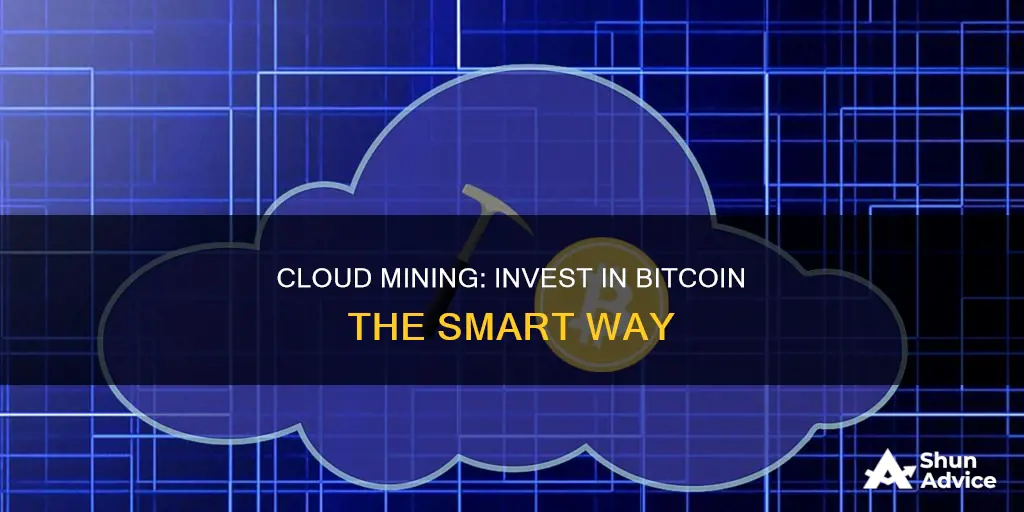
Cloud mining is one of several ways to mine Bitcoin. It involves paying a company to mine cryptocurrency for you. Instead of setting up your own mining device, you rent one from a third-party provider and receive the profits after maintenance and electricity costs are deducted. Cloud mining is a good option if you don't have the upfront costs or technical expertise to set up your own mining hardware. However, it's important to note that cloud mining has its own set of risks, such as the possibility of scams. It is critical to thoroughly research any platforms before investing.
| Characteristics | Values |
|---|---|
| Initial Investment | Starting from $150 |
| Mining Hardware | Not required |
| Mining Returns | Get Bitcoins daily |
| Contract | Choose a ready-made contract or create your own |
| Payment Options | Cryptocurrency, bank cards, bank transfer |
| Mining Duration | Mining begins within 24 hours of contract purchase |
| Mining Power | Bonus mining power with higher contract prices |
| Service Fee | $0.034-$0.040 TH/day |
| Static Rentability | 103.75% to 386.11% |
| Demo Mining | Available for new customers |
What You'll Learn

Cloud mining vs. solo mining
There are several ways to invest in Bitcoin mining, including cloud mining and solo mining. Here is a detailed comparison of the two methods:
Cloud Mining
Cloud mining is a convenient alternative to traditional hardware mining. It allows individuals to rent computing power from remote data centres, eliminating the need for complex hardware setups and maintenance. This model suits those who lack the technical expertise or upfront capital required for hardware mining. Cloud mining platforms often feature user-friendly interfaces, making them accessible to a broader audience.
However, cloud mining also introduces new considerations. Users must carefully research the reliability and security of the cloud service provider, and navigate the fee structures of cloud mining contracts, which can impact overall profitability.
Solo Mining
Solo mining, as the name suggests, involves a miner operating independently and performing mining tasks without relying on a third party. Solo miners connect their rigs directly to a local cryptocurrency wallet client and find blocks. While all rewards are fully credited to the solo miner, the profitability of this method is inconsistent due to the high difficulty of finding blocks.
Solo mining requires substantial resources and capital to operate and maintain mining rigs, including significant electricity costs. It is highly dependent on the overall network hashrate and the hardware hash power available. As the network hashrate and difficulty increase, solo miners may struggle to generate sufficient profits.
The choice between cloud mining and solo mining depends on various factors, including technical proficiency, budget constraints, and the desired level of control over the mining process. Cloud mining offers convenience and accessibility, while solo mining provides more control but demands greater resources and expertise. Individuals should carefully consider their preferences, capabilities, and goals before deciding which method suits their needs.
Russia's Bitcoin Investment: Exploring the Country's Crypto Interests
You may want to see also

How to choose a cloud mining service provider
Cloud mining is a process where individuals can rent mining power from companies that own and operate the mining equipment. This allows people to mine cryptocurrencies without the need to invest in expensive hardware and handle its maintenance. However, it is important to note that there are risks associated with cloud mining, such as scams, regulatory changes, and price volatility. Therefore, it is crucial to choose a reputable and reliable cloud mining service provider. Here are some key considerations when selecting a cloud mining service provider:
- Verify Legitimacy: Conduct thorough research by checking reviews, forums, and regulatory compliance. Look for transparency in their operations and customer feedback. Be cautious of companies making aggressive marketing claims or guaranteeing returns.
- Understand the Fees: Be aware of all the fees involved, including service fees, maintenance fees, and withdrawal fees. Calculate the total cost structure to make an informed decision.
- Assess the Contract Terms: Carefully read and understand the contract terms and conditions, including the duration, fees, and exit clauses. Pay close attention to the provisions regarding unprofitability and service levels.
- Check Mining Output: Look for providers that offer transparent information about expected mining output and rewards. This will help you estimate the potential profitability of the investment.
- Security and Customer Support: Choose a provider that prioritizes security and protects your data and assets. Look for a company with a strong track record of safeguarding users' information and assets. Additionally, opt for a provider that offers responsive and accessible customer support, preferably with 24/7 availability.
- Flexibility and Customization: Select a provider that offers flexible and customizable mining plans to suit your investment goals and risk tolerance. This will allow you to scale your operations as you gain more experience and confidence.
- Reputation and Track Record: Opt for providers with a solid reputation and a proven track record of successful mining operations. Check independent reviews and seek feedback from existing or previous users to gauge their level of satisfaction.
- Payment Methods and Payouts: Ensure that the provider supports your preferred payment methods and offers frequent payouts. Some platforms offer daily payouts, while others may have less frequent payout schedules.
- Regulatory Compliance: Stay informed about the regulatory landscape in your jurisdiction and choose a provider that complies with relevant laws and regulations. This will help protect your investment and reduce legal risks.
- Energy Sources: Consider choosing a provider that utilizes renewable energy sources for mining operations. This not only reduces the environmental impact of mining but also contributes to a more sustainable future.
- Diversity of Cryptocurrencies: If you are interested in mining a specific cryptocurrency or a range of coins, ensure that the provider supports your preferred options. Some platforms offer mining for a limited number of cryptocurrencies, while others provide a more diverse range.
The Legalities of Bitcoin Investment: License Requirements
You may want to see also

Pros and cons of cloud mining
Cloud mining is a mechanism to mine a cryptocurrency, such as bitcoin, using rented cloud computing power without installing and directly running the hardware and related software. Cloud miners become participants in a mining pool, where users purchase a certain amount of "hash power".
Pros of Cloud Mining
- No technical knowledge is required.
- No need to purchase hardware.
- No operating costs, no heat, and no noise.
- Excellent accessibility and mobility.
- Impressively high revenues.
- Mine different crypto coins.
- Offers referral programs.
- No equipment installation or maintenance.
- No impact on electricity consumption.
Cons of Cloud Mining
- A large number of scams.
- It favours the centralisation of the network.
- Constrained to the mining of only some coins.
- No control and suppleness.
- Less profitable.
- Earning decrease over time due to the increase in difficulty of mining.
- Some contracts are limited.
- Fine print in contracts may include maintenance or electricity fees.
Strategizing Bitcoin Investments: How Often to Invest?
You may want to see also

How to create a Bitcoin wallet
Creating a Bitcoin wallet is a simple process, similar to installing an app on your mobile device or laptop/desktop.
There are several types of Bitcoin wallets, each with its own unique features and security protocols. The three main types are:
- Mobile wallets: These are apps for your smartphone that store your coins. Mobile wallets are excellent for investing small amounts of money that you can afford to lose and offer ease of use.
- Software wallets: These are similar to mobile wallets but are installed on your computer. Software wallets are suitable for both beginners and advanced users.
- Hardware wallets: Physical devices, such as a USB stick or a debit card, that you can use to manage your bitcoin. Hardware wallets are the most secure way to store your bitcoin as they keep your crypto offline. However, they are more expensive and less convenient to use.
- Choose a wallet type: Select the type of wallet that best suits your needs. Consider factors such as security, ease of use, and compatibility with your device.
- Select a wallet provider: Research and compare different wallet providers to find one that is reliable and offers the features and security protocols you need. Some popular options include Exodus, Electrum, Trust Wallet, Ledger, and Trezor.
- Download the wallet app: Once you have chosen a provider, download the app to your phone or computer. Make sure to download the app from an official source to avoid malicious software.
- Create an account: Sign up by providing basic information such as your name, email address, and a strong password. Some wallet apps may also require identity verification, such as submitting a government-issued ID and a selfie.
- Set up security features: Enable security features such as two-factor authentication (2FA) to add an extra layer of protection to your wallet.
- Write down your private key: Your private key is a random 12-word phrase that gives you access to your wallet. Keep it in a secure location, as losing this phrase will result in losing access to your crypto.
- Transfer your assets: You can now transfer assets into your wallet. You can do this by depositing funds from a bank account, exchanging cryptocurrencies, or receiving them from another wallet.
Remember to always keep your Bitcoin wallet secure and follow best practices to protect your crypto assets.
Bitcoins: Safe Investment or Risky Gamble?
You may want to see also

How to buy Bitcoin
There are several ways to buy Bitcoin, each with its own advantages and disadvantages. Here is a step-by-step guide on how to get started:
- Choose a crypto-trading service or venue: Select a cryptocurrency exchange that offers Bitcoin and other cryptocurrencies. Examples include Gemini, Kraken, Coinbase, and Crypto.com. These exchanges carry different fees and consumer protections, so be sure to research them thoroughly before choosing one.
- Connect your exchange to a payment option: Most exchanges allow you to connect your bank account directly or link a debit or credit card. Credit cards are not accepted by all exchanges due to processing fees and the risk of fraud. Be aware that using a credit card may result in additional charges and interest rates.
- Place an order: Cryptocurrency exchanges offer various order types, such as market and limit orders. Decide on the type of order you want to place and then place your order.
- Ensure safe storage: It is important to store your Bitcoin securely. You can use a hot wallet, which is an online wallet connected to the internet, or a cold wallet, which is an offline wallet that is not connected to the internet. Hot wallets are best for small amounts of cryptocurrency or actively traded coins. Cold wallets, such as hardware wallets or paper wallets, provide more security but require technical knowledge to set up.
Additionally, you can buy Bitcoin through other methods such as peer-to-peer money transfer apps like PayPal, Venmo, or Cash App, Bitcoin ATMs, and Bitcoin exchange-traded funds (ETFs). Always remember to consider the fees, security, and convenience of each option before making a purchase.
The Ultimate Guide to Investing in Bitcoin
You may want to see also
Frequently asked questions
Cloud mining is when you rent mining hardware and have it hosted by a third-party provider. This is a good option if you don't have the upfront costs or technical expertise to set up your own mining hardware. However, cloud mining has its own risks, such as potential scams, and requires thorough research before investing.
With cloud mining, you pay a fee to a cloud mining service provider, which uses its own hardware to mine cryptocurrency on your behalf. You can research and compare different providers, choose which cryptocurrency to mine, and select machine models, mining durations, and mining pools.
Cloud mining allows you to mine cryptocurrencies without purchasing and setting up your own physical mining rigs. It can be more accessible for those who don't have the technical expertise or upfront costs required for solo mining.
Cloud mining requires committing to a contract, and if cryptocurrency prices fall, you may not break even. Additionally, there is a risk of scams and fraudulent platforms, so thorough research is necessary before investing.







